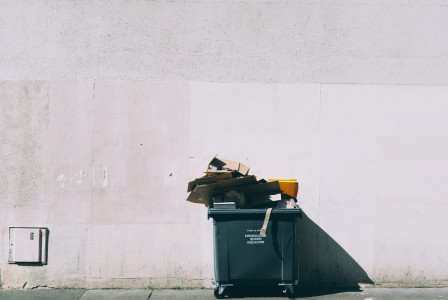News
16 October 2025
New waste rules set to enhance circularity of textile sector and reduce food waste
News
16 October 2025
Sustainable competitiveness
Regulation and public governance
Agri-food
+13 more
Login / create an account to be able to react
-
34

The revised Waste Framework Directive now in force sets EU-wide measures to address textile and food waste and boost the circular economy.
Topics
Albania
Armenia
Austria
Belgium
Bosnia and Herzegovina
Bulgaria
Croatia
Cyprus
Czechia
Denmark
Estonia
EU-27
Finland
France
Georgia
Germany
Greece
Hungary
Iceland
Ireland
Italy
Kosovo
Latvia
Liechtenstein
Lithuania
Luxembourg
Malta
Moldova
Montenegro
Netherlands
North Macedonia
Norway
Poland
Portugal
Romania
Serbia
Slovakia
Slovenia
Spain
Sweden
Switzerland
Türkiye
Ukraine
Other
Academic / Research and VET Institutions
Business Support Organisation
Company with 250 or more employees
Cluster Organisations
Consumer Organisations
EU Institutions
Financial Institutions and Investors
Industry Associations and Chambers of Commerce
International Organisations
Local Authorities
Media / Journalist Organisations
National authorities
Networks and Federations / Confederations
NGOs / Non-profits
Regional Authorities
SMEs (a company with less than 250 employees)
Social Economy Entity
Other
-
Transition Pathway's building blocks
-
-
Sustainable competitiveness
-
Regulation and public governance
-
-
Industrial ecosystems
-
-
Agri-food
-
Retail
-
Textile
-
-
Textiles ecosystem areas
-
-
Fibres, yarns and fabrics
-
Apparel and clothing accessories
-
Household/interior textiles
-
Technical textiles
-
Leather and fur
-
Footwear
-
Research and Innovation
-
Technology and Machinery
-
Waste management, reuse and repair
-
Business support and Communication
-
Not area specific (interested in more than one of the above)
-
Share
Today, the revised rules under the Waste Framework Directive enter into force. This is a significant step forward in addressing textile and food waste. In addition, the revised Directive will promote a circular economy throughout the EU, notably by fostering innovation and moving towards more sustainable industrial and consumer practices.
Regarding the sustainable management of textile waste, the revised Directive introduces two main sets of measures to tackle the significant environmental impacts of the EU's textile and clothing sector. All Member States will be required to establish their own Extended Producer Responsibility (EPR) scheme for textiles and footwear, whereby EPR fees will be collected and used to finance the collection, re-use, re-cycle and disposal of textiles. Furthermore, all separately collected textiles will now be considered as waste. This will ensure a uniform interpretation across Member States of what constitutes ‘waste' versus ‘used' textiles, and Member States will have to ensure separately collected textiles undergo sorting operations prior to their possible shipment.
Fighting food waste is also a key aim of the Directive. By 2030, Member States must reduce food waste by 10% in processing and manufacturing, and by 30% per capita at retail and consumption, which includes restaurants, food services, and households. To meet these targets, Member States will need to evaluate and adapt their food waste prevention programmes. To monitor progress, the European Commission will conduct a comprehensive review by 2027.
Textile production and consumption also have significant environmental impacts, and about 12.6 million tonnes of textile waste was generated in 2019, of which only one-fifth was separately collected for reuse or recycling. Similarly, data reported since 2020 and up to 2023 has shown significant levels of food waste and no clear downward trend so far. The revised Directive represents a crucial opportunity to address these pressing issues.
You can find more information on the revised waste rules online.
Comments (0)
See also
Have your say: the community engagement survey is now open!
- Categories
- Infrastructure Investments and funding R&I, techniques and technological solutions +28 more
Have your say: the community engagement survey is now open!
- Categories
- Infrastructure Investments and funding R&I, techniques and technological solutions +28 more
Have your say: the community engagement survey is now open!
- Categories
- Infrastructure Investments and funding R&I, techniques and technological solutions +28 more




